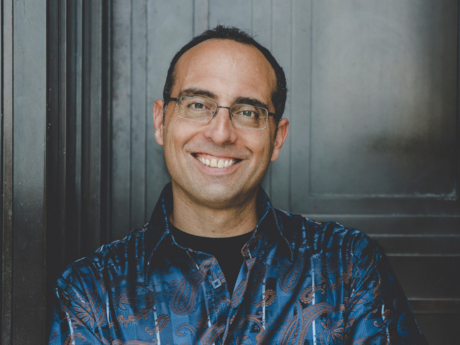Award Winners
Lyric Poetry Award - 2016
Philip Metres

Devotional (after a Muslim Prayer)
Light my face and light the flesh of my flesh,
Light each my eyes and light inside my sight,
Light the light that makes me light in the bones,
And in my hands, light, and in my loins, light,
And light your light before and behind me,
Above and beneath me, light to my right
And light to left, light to my enemies
Who in the moral dark will use my light
Against me, light the dull swords of my ribs,
The thick fist within, light the blood-hot rooms
Pulsing there, light the gates when they swing wide
To the stranger, light more light on my tongue,
In the light, light more light, in the black, light,
and when it's time to snuff this wick—light that light.
Rowan Ricardo Phillips on Philip Metres
"Devotional (after a Muslim Prayer)" is the winner of the 2016 Poetry Society of American Lyric Award. When a reader is asked to distinguish, qualitatively, one poem from another questions about each poems sense of itself begin to arrest the mind. Is the poem's speech act substantive, does the shape of the poem inform how what is being said is being said, do you want to read it again and then again after that, are the chosen words convincing, are they in the right order, does the poem take any risks, does it make you believe that it believes what it is saying, does is sound good?
With admirable conviction and panache, "Devotional (after a Muslim Prayer)" answers affirmatively all of the intuitive and rather vital questions that plague a lyric poem. Yes, the poem is a sonnet and yes it enacts the work of sacred speech and yes by combining the two the poem is enhanced by paradox, sacred light in a secular bottle. Yet the poem's merit rests neither in being a sacred poem or a sonnet. Rather, the poem's great merit is in being aware that is a sacred poem and a sonnet. The distinction between the two is seen in how the poem makes use of convention to overturn it. The poem begins with imperatives that resonate as familiar devotional pleas but ends with an imperative that sounds rather subtly like a command. The sonnet is masterfully taxed by repetition and a monosyllabic pulse; the work "light" is ubiquitous but light itself is absent. The rhymes loosen as the poem progresses and then reappear in the concluding couplet. But is this rhyme or repetition? Note how it is not "light" that rhymes with "light" but rather "black, light" that rhymes with "that light"––a bond of one has become a bond of two. Note as well how the word "stranger" poignantly arrives in the twelfth line of the poem and reorders all that has come before it and that will come after. The 35th verse of the 24th Sura of the Quran, the verse of light, illuminates this poem lightly. Although the poem is beautifully self-contained the lyric gestures toward a life after the last line of the poem, a life enhanced. This is what lyric at its best does, and this is no small task. Congratulation to the poet.
